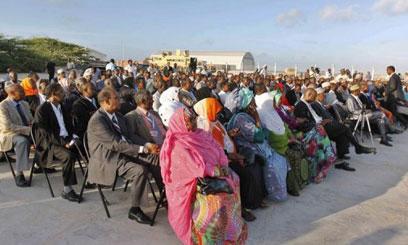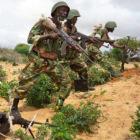Al-Shabaab and post-transition Somalia – By Abdi Aynte

For the first time in four years, the militant group al-Shabaab is not the center of attention in Somalia. Since the fighters were ejected from the capital Mogadishu a year ago by the African Union peacekeepers (AMISOM) and Somali government troops, they’ve sustained dramatic losses in central and southern Somalia – their traditional bastion.
In the last few weeks, al-Shabaab fighters have been withdrawing from major towns ahead of an assault by AMISOM and Somali troops. This is a radical shift from their recent past, when they lost upwards of 200 ill-trained troops (mostly young pupils) defending the Bakara market in Mogadishu. Somalia’s largest market was by far the most important revenue source for the militants.
The decline in al-Shabaab’s fortunes is driven by a confluence of factors. Primarily it is down to their abject failure to articulate a broad, coherent vision for Somalia since they formally joined al-Qaeda in February 2012. After coming to the fore in 2006, the militants have straddled a nationalist platform, which worked in their favor, and a global jihadist vision, which proved to be disastrous – the Somali people consistently and overwhelmingly rejecting it.
For almost five years, al-Shabaab recruited thousands of impressionable boys across the country on a largely nationalist, anti-foreign occupation platform. Exploiting a popular anger among the Somali people as a result of Ethiopia’s invasion in 2007, the militants successfully fought against the regional powerhouse, eventually forcing the Ethiopians to ingloriously withdraw their forces.
With Somalia’s “˜arch rival’ out of the picture, al-Shabaab turned their attention to AMISOM – a 17,000 strong force comprised of Ugandan and Burundian soldiers, with few hundred coming from Djibouti. But their attempt to portray AMISOM as an invading force hasn’t worked. Despite causing serious collateral damage, AMISOM is by and large viewed as a neutral force that, unlike the so-called “˜frontline states’ (Ethiopia and Kenya), does not meddle in the internal affairs of Somalia.
Always agile in this regard, al-Shabaab shifted its core message from AMISOM to the Somali government, which it successfully portrayed as a deeply corrupt entity, led by irreconcilable egos. During 2009 and 2010, al-Shabaab convinced a good number of the Somali population that the weak, incompetent government was not only a foreign concoction, but also a group of disparate clan chauvinists who are in it for their own personal enrichment, not for material betterment of the Somali people. In this manner the militants presented themselves as a credible alternative.
The government’s actions lent weight to these assertions. It failed to provide rudimentary services and establish basic state functions, this contrasted to al-Shabaab’s then sophisticated governing system, which used an advanced tax regime and provided the most reliable security to citizens under its domain. The Somali government was also notorious for infighting, state-sponsored theft, predatory soldiers and sheer incompetence.
Despite making commendable improvements since former Prime Minister Mohamed Abdullahi Farmaajo formed a short-lived technocratic cabinet in November 2010, the Somali government continued to be shaped by individualistic ambitions rather than institutional policies. Corruption has also remained endemic, as documented by a recent UN report.
Post-transition scenarios
The 12-year-long transition is coming to an end in Somalia. A new, leaner parliament is expected to choose a president in September, followed by the formation of a new cabinet. It is billed as a glorious dawn for a country ravaged by 21 years of internecine war and extremism. And there are plenty of reasons for optimism.
But if the new government, likely to be dominated by some of the old guard, doesn’t establish transparent state institutions, the militants (currently marginalized) will almost certainly exploit the vacuum.
For more than a year, al-Shabaab has been fine-tuning its military strategy. The consensus among its leaders was to morph into a guerrilla movement and abandon traditional warfare by withdrawing into “˜Somalia’s Tora Bora’ – the mountainous region in Sanaag in the northeast, and into Ras Kamboni – a vast area of inaccessible jungles in Lower Jubba, near the border with Kenya. Both locations have been extremist hideouts for two decades.
Yet it’s al-Shabaab’s political strategy that’s likely to be more effective than its military one. The group now plans to rebrand itself as the alternative to the new Somalia government, should the latter becomes yet another playground for rapacious men.
Notwithstanding their brutal justice system, al-Shabaab has a track record of delivering three fundamental things that successive Somali governments have utterly failed to achieve: basic security, stemming corruption and a non-sectarian governing structure.
Unlike the new Somali government, which has a four-year term to achieve something, al-Shabaab is neither bound by term limits nor by a legal framework. Its faceless leaders are prepared to stay in the periphery until the new government commits suicide.
Now that it is the center of attention, the new Somali government must deliver””and fast.
Abdi Aynte is a Somali-American journalist and researcher







“During 2009 and 2010, al-Shabaab convinced a good number of the Somali population that the weak, incompetent government was not only a foreign concoction, but also a group of disparate clan chauvinists who are in it for their own personal enrichment, not for material betterment of the Somali people”
to be fair, they weren’t far off the mark there….but good article, thank you.